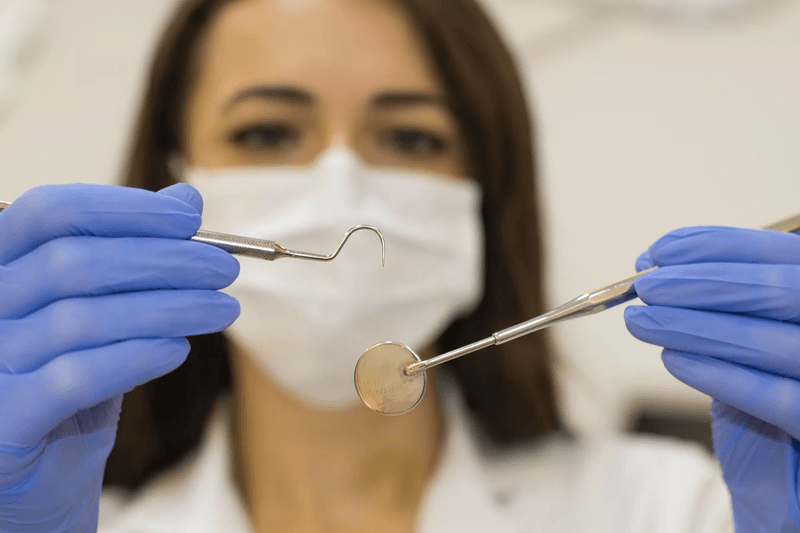Is dentistry your dream profession? Have you ever wondered what type of training dentists undergo? Are you curious about what your everyday dentist does? If so, you are right where you need to be. Dentists have the joy and satisfaction of continually improving the lives of others.

The path to becoming a dentist can be challenging but rewarding. Every profession has its pros and cons, so taking the time to research a potential job before you commit is a wise move.
You ought to know exactly what you are getting into before asking how to become a dentist. Needless to say, the pros of a career in dentistry are far more significant than the cons.
In this article, we will review the basic benefits and challenges of dentistry and some tips on how to get started in a career in dentistry.
Dental professionals hold doctoral degrees, such as a Doctor of Dental Surgery (DDS) or a Doctor of Dental Medicine (DMD). Both degrees have the same meaning and are earned through the same education. The dental school is responsible for choosing what degree to award.
New dentists have numerous options available to them after dental school. After completing their education, they can pursue a post-doctoral program or residency to receive advanced training in one of the 9 dental specialties.
Dentistry specialties include Oral & Maxillofacial Surgery, Oral & Maxillofacial Radiology, Oral & Maxillofacial Pathology, Orthodontics, Periodontics, Prosthodontics, Pediatric Dentistry, and Dental Public Health.
There are a variety of dental programs and residencies after dental school ranging from 1 to 6 years of advanced training.
An individual who does not wish to undergo advanced training can become a general dentist and pursue a variety of different areas within dentistry.
You can choose to pursue a career in other areas including academics, research, military, public health, corporate dentistry, private practice, group practice, international health care, and hospital care.
Dentistry is a very well-respected profession in most countries. It is no surprise that dentists are respected and trusted figures within their communities. Various people, including patients, rely on advice given by dentists, so their social status is relatively high.
Well-trained dentists possess a range of skills and knowledge that aid in treating dental problems. By offering people a beautiful smile and repairing their teeth, you can also make a significant impact on their lives. The positive effect of this on their self-confidence and lives is more than you might realize.

Dentistry is one of the most secure careers you can pursue, having one of the lowest unemployment rates in the country. Oral healthcare is necessary no matter where you are, especially with the aging population.
Younger dentists are especially in demand. As a result, after you're done being a student, you won't have to worry about whether or not you'll get a job.
Among the highest-paying jobs in the U.S. are dentists. Taking into account the 2020 data published by the Bureau of Labor Statistics, a dentist earns $164,010 a year on average.
Depending on the type of work they perform and the amount of work they do, dentists can control how much they can make. This is just an example, you could also specialize in different things that can make you even more money in a relatively short period.
Dentists can maintain a balance between work, family, and social life. Work can be done based on your preferences, so you can devote the rest of the time to other activities such as spending time with family. You will have no problems developing your social life upon becoming a well-respected dentist in your community.
The potential to self-employ and set your own schedule is a very big advantage of being a dentist. By setting up your own dental practice, you can be in total control of your schedule. This is assuming you have the finances to do so. In other health professions, this is uncommon, and you can certainly use this as an advantage in a number of ways.
Now that you’ve gotten yourself familiar with the perks of becoming a dentist, let’s take a look at the other side of the coin.
Dentistry is clearly not an easy profession to enter. You'll need to invest 7-8 years studying after high school.
Although you may not be required to have a bachelor's degree when entering dental school, getting one is highly encouraged. This means you will need to spend three to four years studying at a university to earn your bachelor's degree, and possibly more if you intend to major in something specific.
A science major is usually a prerequisite for dental school, as it provides a firm foundation for what follows. Specific courses are required before you can enroll in dental school. Other than that, the courses required can vary from school to school.
To get into a dental school, you must take the DAT (Dental Admission Test) after graduating from university. Dentists attend a four-year doctoral program, which can sometimes be stressful and demanding.
After you graduate, you can earn a DDS or DMD depending on what school you attend.
If you wish to gain more experience and enhance your skills as a dentist, you can enroll in post-graduate-level programs. You can also choose to specialize in an area of dentistry, which usually takes two to six years more than a general dentistry program.
The question of how to become a dentist carries a lot of weight and as we have already mentioned, becoming a dentist is no easy task.
Depending on a number of factors, you will spend a great deal of time operating on a single patient while attending long and tiring school days. There will likely be times you will have to work extended hours.
Dentists work full-time, and some of them even work evenings and weekends. A dentist who owns their own practice can set their own schedule, which is a great benefit. However, dental practices usually work evenings and weekends due to debt, expenses, etc.
That being said, you could work less than full-time and not work weekends. It is not uncommon to operate on someone on a weekend night at 9 pm, especially if you offer a weekend emergency line.
As a medical professional, you have a responsibility to patients, and therefore, you should try your best to satisfy their needs. Unfortunately, this usually requires you to sacrifice some of your personal time.
If you're considering becoming a dentist, you better get used to debt as it will be your constant companion. A graduate program in dental college is among the most expensive in the United States.
To give you an idea, the average dental student graduating from dental school will have a debt of more than $250,000. Those attending the most expensive dental schools will be saddled with an average of around $500,000 in debt when they graduate.
Your debt will rise considerably if you add in the debt you will generate from home, a vehicle, an office, and much more.
You can buy an existing practice building or rent one if you're considering going self-employed. Prices will vary according to the region, type of services, state, and condition of the building.
Typically, a $500,000 purchase price would be expected. This can be extremely tiring and hard to handle all at once. That's another reason to be informed about the disadvantages of becoming a dentist.
The mere act of just reading all this can cause a person to become very stressed. Your ability to handle stress will have to be developed over time. Dental professionals are somewhat medical professionals, so you must have the ability to handle pressure.

Make sure you know the stress you experience will extend beyond your operating chair. You may have to manage tasks, schedule, stock supplies, etc., regardless of whether you are self-employed. Almost certainly, you'll also be concerned about your competition and whether you're on track.
The practice facility you use can greatly influence your stress levels. Imagine being confined to the same room for hours and hours, unable to leave out of your focus the patient you are treating at the moment.
Moreover, you will need to be able to handle blood and other fluids due to the nature of the job. For some people, this can be extremely stressful, while others may not be as affected. If you intend to be a dentist, you should determine what type you are.
There will be no shortage of work as a dentist, but this is a two-way street. A dentist is also likely to face a lot of competition.
Be prepared to compete not just as a dentist, but also as a student. Dentist colleges are highly competitive, with thousands of applicants each year. Because it's a rewarding profession with good benefits and a good income.
A good GPA and a great DAT score are needed, so it is important to attend a good university. However, once you are in dental school, you will still need to compete against other students for patients.
Dentistry requires that you be aware of where you live and where you practice. It is not unusual to find three to four dentists close to one another in major metropolises. As a result, patients will be harder to come by, and your marketing efforts will cost more.
Dentistry is a gratifying profession, one that offers many rewards as well. The negative aspects of the profession have been emphasized heavily, but theoretically, the positives outweigh the negatives.
In addition to understanding exactly what the profession entails, you must be committed to it as you will be caring for and looking after your patients' needs as the caretaker.
It is a tremendous responsibility, but being able to provide quality care that changes lives for the better is very important and satisfying.
Looking to start preparing for the DAT exam? Get started with PATcrusher, which offers the best PAT Resource for the DAT.